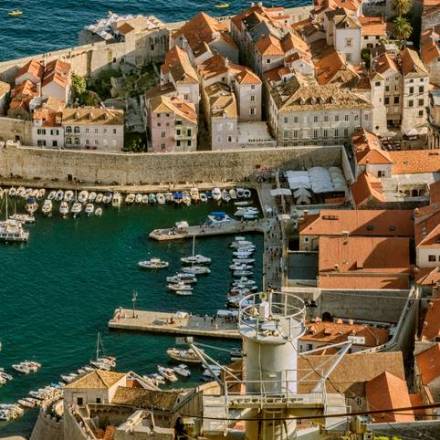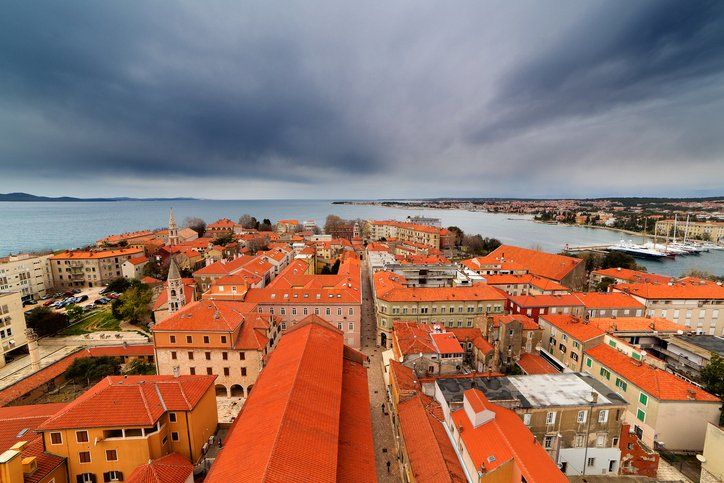
30
de Juny
de
2016
Act.
30
de Juny
de
2016
Beyond competing with Girona to see who can offer the most attractive locations for scenes in Game of Thrones, Croatia is quickly taking advantage of its European Union membership (2013) to become the entry way for business in the Balkans. "All countries say that they have a strategic location, but in this case it is true. It is the bridge between north and south Europe," says Berislav Čižmek, CEO de CBBS, during Acció's Internationalisation Week. The consultancy firm he heads is devoted to "connecting people", opening the door of investment and business to the region of the Balkans, the Adriatic and the Danube, the three points of Croatian influence.
Tourism, a sector that wants to grow
The well-travelled already know the attractions of Dalmatia. Dubrovnik, Split and Zadar making up an unmissable route along the Croatian coast, and which has found tourism to be the best economic boost to reconstructing the country devastated by war not so many years ago. "There are a lot of opportunities in construction and tourist facilities," says Čižmek. "Croatia wants to improve the quality of its hotels, so that they have 4 or 5 stars, as most of the accommodation is in the form of apartments," he adds.
The experience and knowledge of Catalan companies, therefore, is very welcome in a country where "last year 25 hotels and resorts opened, with 40 more due this year," according to Dario Kobešćak, head of Invest in Croatia's Investment Support Division.
Making the most of European resources
Beyond tourism and construction, agriculture, the pharma sector, textiles, logistics and distribution are also areas of interest for Catalan companies. In all, in a country that, as a new member of the EU, receives and will receive important injections of community funds. They are funds that, according to the director of the Generalitat's Oficina de Comerç i Inversions in Brussels, Ana Coelho, "are basically spent through tendering." Even though the funds are very large, such as those destined for infrastructure, Coelho says that "small companies can put themselves forward as part of a consortium, taking advantage of the fact that the technological component increasingly counts for more."
In fact, Coelho says that Croatia is the country that proportionately receives the most European funds in the whole area. "It gets the IPA from when it was a candidate (2007-2013) and the money from the first year of its adhesion. Moreover, it has the 2014-2020 programme, in which they have opted greatly for developing the economy, fighting unemployment, the environment and the reconstruction of the country's heritage," she lists. The Catalan firm ApplusIdiada, for example, is one of the companies that has already benefited with an innovative project carried out with Rimac Automobili, 50% of which is funded by the EU.
A fully-formed country
Eurostat data show that Croatia is the European country with the lowest school dropout rate. This is merely one indicator for understanding why "working there is very simple," according to Berislav Čižmek. "The population has a high level of education, speaks various languages and is competent," he insists. "Half of the population speaks English, 34% German and 14% Italian," says Dario Kobešćak.
Open to international investment
The head of Invest in Croatia, an organisation that has been active for three years, recognises that "we know we have to change our legislation, making a new law to promote investment. Labour law also needs to be changed as well as improvements in business legislation." Nevertheless, he points out that in 11 years Croatia has climbed 78 places in the Doing Business ranking, 49 of them in the past two years. "In 2005, some 49 days were needed to set up a business, now 12 is enough," says Kobešćak as an example.
The investment law proposed by the Croatian government in 2012 promotes sectors such as manufacturing, the setting up of technology centres, business services and tourism. "You have tax incentives of all types. With a minimum investment of 150,000 euros or by employing a minimum of five people, you can reduce taxes to 0% and receive between 3,000 and 18,000 euros per employee," says Kobešćak. Moreover, the country has very receptive industrial zones, such as Šibenik or Bakar, where "you can get a building permit in a single day."
For his part, Berislav Čižmek points out that in Croatia all EU standards apply, which "can provide companies with security along with macroeconomic stability." The CBBS CEO points out finally that "labour costs continue to be lower in Croatia than in the rest of EU countries," given that the average salary is 750 euros.
Tourism, a sector that wants to grow
The well-travelled already know the attractions of Dalmatia. Dubrovnik, Split and Zadar making up an unmissable route along the Croatian coast, and which has found tourism to be the best economic boost to reconstructing the country devastated by war not so many years ago. "There are a lot of opportunities in construction and tourist facilities," says Čižmek. "Croatia wants to improve the quality of its hotels, so that they have 4 or 5 stars, as most of the accommodation is in the form of apartments," he adds.
The experience and knowledge of Catalan companies, therefore, is very welcome in a country where "last year 25 hotels and resorts opened, with 40 more due this year," according to Dario Kobešćak, head of Invest in Croatia's Investment Support Division.
Making the most of European resources
Beyond tourism and construction, agriculture, the pharma sector, textiles, logistics and distribution are also areas of interest for Catalan companies. In all, in a country that, as a new member of the EU, receives and will receive important injections of community funds. They are funds that, according to the director of the Generalitat's Oficina de Comerç i Inversions in Brussels, Ana Coelho, "are basically spent through tendering." Even though the funds are very large, such as those destined for infrastructure, Coelho says that "small companies can put themselves forward as part of a consortium, taking advantage of the fact that the technological component increasingly counts for more."
 |
| Zadar on the north coast of Dalmatia won the Best Tourist Destination 2016. Getty |
In fact, Coelho says that Croatia is the country that proportionately receives the most European funds in the whole area. "It gets the IPA from when it was a candidate (2007-2013) and the money from the first year of its adhesion. Moreover, it has the 2014-2020 programme, in which they have opted greatly for developing the economy, fighting unemployment, the environment and the reconstruction of the country's heritage," she lists. The Catalan firm ApplusIdiada, for example, is one of the companies that has already benefited with an innovative project carried out with Rimac Automobili, 50% of which is funded by the EU.
A fully-formed country
Eurostat data show that Croatia is the European country with the lowest school dropout rate. This is merely one indicator for understanding why "working there is very simple," according to Berislav Čižmek. "The population has a high level of education, speaks various languages and is competent," he insists. "Half of the population speaks English, 34% German and 14% Italian," says Dario Kobešćak.
Open to international investment
The head of Invest in Croatia, an organisation that has been active for three years, recognises that "we know we have to change our legislation, making a new law to promote investment. Labour law also needs to be changed as well as improvements in business legislation." Nevertheless, he points out that in 11 years Croatia has climbed 78 places in the Doing Business ranking, 49 of them in the past two years. "In 2005, some 49 days were needed to set up a business, now 12 is enough," says Kobešćak as an example.
The investment law proposed by the Croatian government in 2012 promotes sectors such as manufacturing, the setting up of technology centres, business services and tourism. "You have tax incentives of all types. With a minimum investment of 150,000 euros or by employing a minimum of five people, you can reduce taxes to 0% and receive between 3,000 and 18,000 euros per employee," says Kobešćak. Moreover, the country has very receptive industrial zones, such as Šibenik or Bakar, where "you can get a building permit in a single day."
For his part, Berislav Čižmek points out that in Croatia all EU standards apply, which "can provide companies with security along with macroeconomic stability." The CBBS CEO points out finally that "labour costs continue to be lower in Croatia than in the rest of EU countries," given that the average salary is 750 euros.